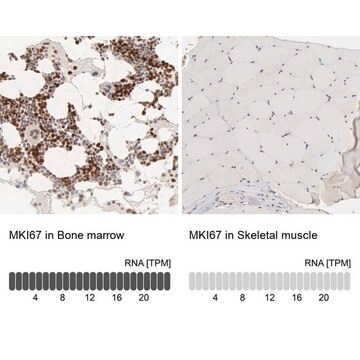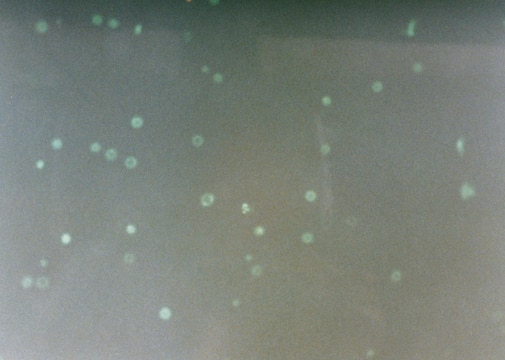P6834
Monoclonal Anti-Proliferating Cell Protein Ki-67 antibody produced in mouse
clone PP-67, ascites fluid
Synonyme(s) :
Anti-Ki-67
About This Item
Produits recommandés
Source biologique
mouse
Conjugué
unconjugated
Forme d'anticorps
ascites fluid
Type de produit anticorps
primary antibodies
Clone
PP-67, monoclonal
Contient
15 mM sodium azide
Espèces réactives
human
Technique(s)
immunoblotting: suitable
immunohistochemistry (formalin-fixed, paraffin-embedded sections): 1:800 using microwave-treated human tonsil sections
microarray: suitable
Isotype
IgM
Numéro d'accès UniProt
Conditions d'expédition
dry ice
Température de stockage
−20°C
Modification post-traductionnelle de la cible
unmodified
Informations sur le gène
human ... MKI67(4288)
Catégories apparentées
Description générale
Spécificité
Immunogène
Application
Immunocytochemistry (1 paper)
Immunocytochemistry.
Monoclonal Anti-Proliferating Cell Protein Ki-67 antibody produced in mouse has also been used for immunohistochemistry.
Actions biochimiques/physiologiques
Clause de non-responsabilité
Vous ne trouvez pas le bon produit ?
Essayez notre Outil de sélection de produits.
Code de la classe de stockage
10 - Combustible liquids
Classe de danger pour l'eau (WGK)
nwg
Point d'éclair (°F)
Not applicable
Point d'éclair (°C)
Not applicable
Faites votre choix parmi les versions les plus récentes :
Déjà en possession de ce produit ?
Retrouvez la documentation relative aux produits que vous avez récemment achetés dans la Bibliothèque de documents.
Les clients ont également consulté
Articles
Cell based assays for cell proliferation (BrdU, MTT, WST1), cell viability and cytotoxicity experiments for applications in cancer, neuroscience and stem cell research.
Notre équipe de scientifiques dispose d'une expérience dans tous les secteurs de la recherche, notamment en sciences de la vie, science des matériaux, synthèse chimique, chromatographie, analyse et dans de nombreux autres domaines..
Contacter notre Service technique











